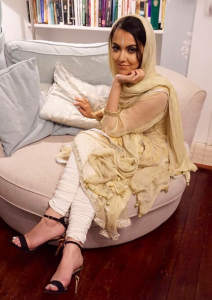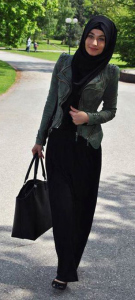“Why I love wearing hijab” (no, not me)

Ruqaiya Haris
I love this post, from Ruqaiya Haris on Dazed. She’s found a solution to finding her personal comfort zone around the gender gap and the oppressive male gaze, and found a way to feel liberated and in control: She has adopted traditional Muslim hijab for daily wear. From her post:
I grew up in a fairly relaxed Muslim household, in a pretty much all-white suburb of North London. Like a lot of diaspora kids I was somewhat culturally confused, as well as totally disengaged from Islam, which I generally associated with stifling restrictions and rules. And so in my early teenage years I began to take great pleasure in rebelling against my cultural upbringing in any way I could. I partied a lot and fell into long periods of reckless highs and consuming, depressive lows. By the age of 16 I began to mature into somebody considered attractive by mainstream beauty standards, and I noticed that I was getting a lot more male attention.
But Ruqaiya came to realize that the attention she was getting was not what she really wanted: Men were treating her as a sex object—and while that was flattering on one level, it also made her feel judged by her beauty alone and not treated by men as an equal, but solely as an object of desire.
By practicing hijab and covering some of the most traditionally attractive parts of a woman, the hair and body, I feel so much more in control. I no longer feel like an object ready for public consumption.
I’ve been known to say from time to time that it amazes me how much women in the United States, demanding to be seen as equals in the workplace, will at the same time come to work in clothing often better suited for a club than an office; highlighting their attributes in tight clothing, wearing heels, using heavy makeup and “showing skin,” in a work environment where (in theory) no one is supposed to notice gender or treat a woman differently than a man wearing long slacks and a button-down shirt. In a work area, where that behavior is supposed to be frowned upon, women almost seem to be deliberately tempting men… and with their favorite bait. And I think that this dichotomy is a main reason for workplace inequality and unneeded social stress.
It’s been my opinion that if women want to be treated as equals in the workplace, as opposed to looking fashionable (which, for American women, equals male-gaze attraction), either they should dress for business—cutting back on or eliminating makeup, adopting business suits including tailored long slacks, no low-neckline/cleavage-baring tops, avoiding form-fitting clothing, heels, etc—or men should start wearing more physically revealing and tighter clothing in the office, to even the scales. (We’d probably be better off if women started covering up… but if it goes the other way, I am fully prepared to rock a Bermuda suit and crew-neck top next summer.)
A new television series, Mr. Robot, helps drive this point home. In it, Trenton, a Muslim girl and one of the hackers that works with the main character, wears hijab… as opposed to Darlene, another hacker who wears more fashionable American women’s clothing. Trenton is seen (and treated by the writers) as a hacker first, a girl second; Darlene is seen (and treated by the writers) as a girl first, a hacker second. It’s a subtle but relevant example of the difference in how women are seen and treated, depending on how sexually overt their clothing is.
(Most American television is a lot more blatant than this: A businesswoman’s implied sexual prowess is always defined by the very skin-baring workplace fashions she wears, which always include low-cut tops, tight knee-length or shorter skirts and stiletto heels; women being portrayed as not sexually active, introverted, etc wear mid- or high-neck shirts, leg-covering skirts or slacks and flat-heeled shoes. Hijab has not yet become standard wear for American TV women, but “schoolmarm” fashions are accomplishing the same thing.)
 Ruqaiya’s solution for women would make great sense in the US, as well as any number of regions in the world, to better even the playing field for women in business and other social situations… and to take some of the sexual pressure off men, who are uncomfortable in a work environment where a woman can dress pretty and even alluring, but even an innocent complement to that co-worker can quite literally cost him his job.
Ruqaiya’s solution for women would make great sense in the US, as well as any number of regions in the world, to better even the playing field for women in business and other social situations… and to take some of the sexual pressure off men, who are uncomfortable in a work environment where a woman can dress pretty and even alluring, but even an innocent complement to that co-worker can quite literally cost him his job.
Here’s hoping Ruqaiya’s style choices catch on in more (intended-to-be) gender-neutral workplaces.





